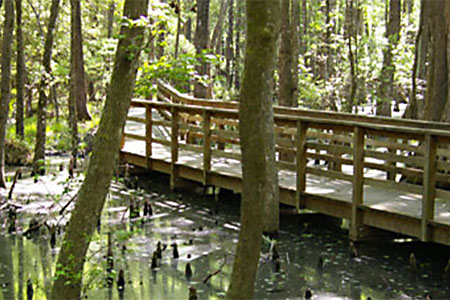
School
Groups can learn about natural history, plantation crops, and diverse ecosystems during their visit. The Natural Resource Management program demonstrates conditions that can attract animal and plant life to conservation sites. Groups can also observe birds in the park, collect samples from habitats, learn about food webs, or dye their own t-shirts while learning about Carolina’s Indigo crop. Social studies programs explore South Carolina’s history with activities, discussions, and artifacts.
supports classroom learning in:
Environmental Studies, Social Studies.
topics covered:
Natural History, Agriculture, Ecology, Plants, Animals, Conservation, Textiles, American History, Colonial History.
contact info
Phone: 843-762-8015
Email: [email protected]
INFO
ABOUT
Caw Caw Interpretive Center
The Ravenel Caw Caw Interpretive Center offers a journey into the past and discovery of heritage. Rich in natural, cultural and historical resources, Caw Caw was once part of several rice plantations and home to enslaved Africans who applied their technology and skills in agriculture to carve the series of rice fields out of cypress swamps.
contact info
Hrs: Tues.-Sun. 9AM-5PM.
HELPFUL LESSON PLAN(S)
Prepared by FieldTripDirectory.com
Nature Exploration Lesson Plan
FUN FACTS
One single tree can provide the oxygen required for two human beings and over 8,000 sheets of paper. Trees can also clean the soil and air by absorbing harmful pollutants. So what have you done for a tree lately? Nature centers and state parks provide a hands-on environment to discover facts about native plants and animals, as well as ways to preserve these natural resources.
View Lesson Plan>>
Scouts
Groups can learn about natural history, plantation crops, and diverse ecosystems during their visit. The Natural Resource Management program demonstrates conditions that can attract animal and plant life to conservation sites. Groups can also observe birds in the park, collect samples from habitats, learn about food webs, or dye their own t-shirts while learning about Carolina’s Indigo crop. Social studies programs explore South Carolina’s history with activities, discussions, and artifacts.
supports scout badges in:
Environmental Science, Social Studies.
topics covered:
Natural History, Agriculture, Ecology, Plants, Animals, Conservation, Textiles, American History, Colonial History.
contact info
Phone: 843-762-8015
Email: [email protected]
INFO
ABOUT
Caw Caw Interpretive Center
The Ravenel Caw Caw Interpretive Center offers a journey into the past and discovery of heritage. Rich in natural, cultural and historical resources, Caw Caw was once part of several rice plantations and home to enslaved Africans who applied their technology and skills in agriculture to carve the series of rice fields out of cypress swamps.
contact info
Hrs: Tues.-Sun. 9AM-5PM.
HELPFUL LESSON PLAN(S)
Prepared by FieldTripDirectory.com
Nature Exploration Lesson Plan
FUN FACTS
One single tree can provide the oxygen required for two human beings and over 8,000 sheets of paper. Trees can also clean the soil and air by absorbing harmful pollutants. So what have you done for a tree lately? Nature centers and state parks provide a hands-on environment to discover facts about native plants and animals, as well as ways to preserve these natural resources.
View Lesson Plan>>
Camp
Groups can learn about natural history, plantation crops, and diverse ecosystems during their visit. The Natural Resource Management program demonstrates conditions that can attract animal and plant life to conservation sites. Groups can also observe birds in the park, collect samples from habitats, learn about food webs, or dye their own t-shirts while learning about Carolina’s Indigo crop. Social studies programs explore South Carolina’s history with activities, discussions, and artifacts.
topics covered:
Natural History, Agriculture, Ecology, Plants, Animals, Conservation, Textiles, American History, Colonial History.
contact info
Phone: 843-762-8015
Email: [email protected]
INFO
ABOUT
Caw Caw Interpretive Center
The Ravenel Caw Caw Interpretive Center offers a journey into the past and discovery of heritage. Rich in natural, cultural and historical resources, Caw Caw was once part of several rice plantations and home to enslaved Africans who applied their technology and skills in agriculture to carve the series of rice fields out of cypress swamps.
contact info
Hrs: Tues.-Sun. 9AM-5PM.
HELPFUL LESSON PLAN(S)
Prepared by FieldTripDirectory.com
Nature Exploration Lesson Plan
FUN FACTS
One single tree can provide the oxygen required for two human beings and over 8,000 sheets of paper. Trees can also clean the soil and air by absorbing harmful pollutants. So what have you done for a tree lately? Nature centers and state parks provide a hands-on environment to discover facts about native plants and animals, as well as ways to preserve these natural resources.
View Lesson Plan>>
Homeschool
Groups can learn about natural history, plantation crops, and diverse ecosystems during their visit. The Natural Resource Management program demonstrates conditions that can attract animal and plant life to conservation sites. Groups can also observe birds in the park, collect samples from habitats, learn about food webs, or dye their own t-shirts while learning about Carolina’s Indigo crop. Social studies programs explore South Carolina’s history with activities, discussions, and artifacts.
supports classroom learning in:
Environmental Studies, Social Studies.
topics covered:
Natural History, Agriculture, Ecology, Plants, Animals, Conservation, Textiles, American History, Colonial History.
contact info
Phone: 843-762-8015
Email: [email protected]
INFO
ABOUT
Caw Caw Interpretive Center
The Ravenel Caw Caw Interpretive Center offers a journey into the past and discovery of heritage. Rich in natural, cultural and historical resources, Caw Caw was once part of several rice plantations and home to enslaved Africans who applied their technology and skills in agriculture to carve the series of rice fields out of cypress swamps.
contact info
Hrs: Tues.-Sun. 9AM-5PM.
HELPFUL LESSON PLAN(S)
Prepared by FieldTripDirectory.com
Nature Exploration Lesson Plan
FUN FACTS
One single tree can provide the oxygen required for two human beings and over 8,000 sheets of paper. Trees can also clean the soil and air by absorbing harmful pollutants. So what have you done for a tree lately? Nature centers and state parks provide a hands-on environment to discover facts about native plants and animals, as well as ways to preserve these natural resources.
View Lesson Plan>>
